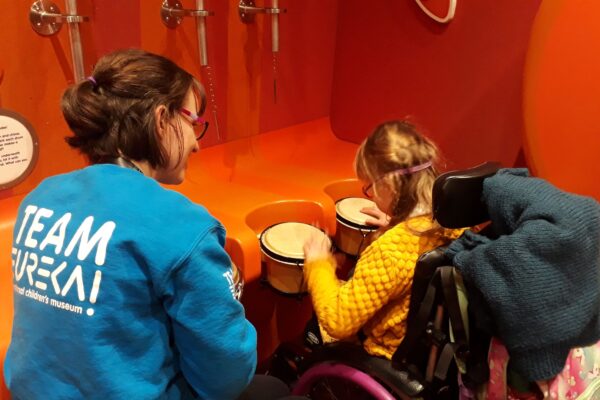Staff training

Staff training is an important part of developing your museum’s SEND offer because the new resources you develop will not stand alone. Even with the most inclusive and accessible building, displays, and resources, a museum visit will be let down by negative contact with the staff—and that means all staff—working there. Negative interactions can impact future museum visits as “these spaces” are then seen as isolating and exclusionary.
This is evidenced in the 2019 study from Ecclesiastical, which surveyed SEND families who had visited museums, castles, and heritage sites and found that “42% of parents with special needs children reported that staff or visitors were unfriendly or made them feel uncomfortable.” (Ecclesiastical, 2019)
Whilst a certain skill set and sensitive level of customer care is needed to “manage” the negative behaviour of other visitors, there should be zero tolerance for staff who display negative attitudes towards visiting SEND children and their families (just as there is against any other protected characteristic).
Such attitudinal bias usually stems from the fear of the unknown and not knowing how to cope with unpredictable situations. If you like, there is comfort in knowing the “risks” you face every day and anxiety in “winging it”.
Occasionally, bias comes from deeper held beliefs about a group of people. For our purposes, this bias often surrounds the idea that museums are solely places of “learning”, so anyone less able to learn in the traditional sense won’t get anything from visiting. In extreme cases, this would stretch to “shouldn’t be allowed in” a museum. Reading this, you may feel defensive about the staff you work with and the values your museum holds with regards to access and equality, but we still suggest starting with an opportunity for open discussion with staff to lay the foundation for good work.
Depending on the size of your organisation, you may be able to hold these early discussions in team meetings, staff training sessions, or senior management meetings. Or, if you are working in a very large organisation, you may feel a survey better captures staff views. You might start by simply asking, “Who are museums for?” or “What do you think visitors get out of a visit to our museum?” or even “What types of learning happen in our museum?”
Hopefully, you will get a range of answers in return, providing a basis on which to build your staff training. Depending on the role of the staff member, they may need training support in different areas. Front of house, shop, café, and facilities staff may feel that communication, behaviour, and sensory processing are areas that come up as potential challenges for them. Training may therefore lean towards learning basic sign language, such as British Sign Language (BSL), getting Makaton training, using and explaining PECS or symbols, using spoken plain-use language and nonverbal (body) language, as well as gaining confidence in social interactions, such as communicating to include a SEND child not just their adult parent/carer.
Challenging or unpredictable behaviour is often ring-fenced to particular conditions, such as autism, but can be an outcome for many different groups if triggered by something. Autism awareness training is a great way to develop strategies and staff confidence in managing unpredictable situations and is beneficial to understanding and supporting the wider SEND visitor group.
We discuss sensory processing on its own page on this website, but it is also useful for front of house and facilities staff to have an awareness of these needs and know how they can help support a visit.
Learning and curatorial staff may benefit from training on sensory interpretation and storytelling and the practical resources needed to support engagement in different ways, many of which are in our “How—Getting Started” section of this website.
Part of your museum’s commitment to becoming SEND welcoming may be to look outwards, beyond your museum, for groups within your community that can come and train you and advise on what makes a museum more attractive to them. Working with people from your community will provide the benefit of local knowledge and connection to other groups near you, plus bring an important relevance. Consider working with local SEND schools, too; ask for training perhaps as staff CPD in exchange for space for meetings or free visits for classes.
In the “Who” section of this website, you will find an ever-growing list of disability access trainers who specialise in different areas in SEND. They will offer a good grounding to build on with your local groups.
Lastly, it is worth noting that this is not a quick fix but a journey which will take time. All journeys that travel the more scenic route take longer, but they make more meaningful experiences than those travelled along motorways!



